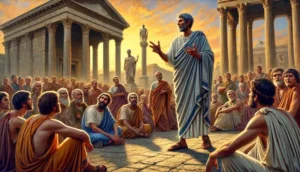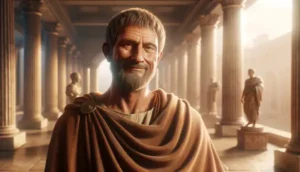In letters from a stoic 30, Seneca talks about their friend Bassus who is extremely ill and about to draw his last breath. Despite being extremely weak, the man’s mind is still very active. Seneca has attributed this to philosophy. “Philosophy bestows this boon upon us; it makes us joyful in the very sight of death, strong and brave no matter in what state the body may be, cheerful and never failing though the body fail us”.
The wise old man has been telling Lucilius to prioritize the nourishment of the mind of the body because its benefits compound with years. It allows one to accept death cheerfully but it takes a long time to practice Seneca said. “This is a great accomplishment, Lucilius, and one which needs long practice to learn—to depart calmly when the inevitable hour arrives” Their friend Bassus seemed also to do death funeral simulation practiced by Pacuvius who Seneca mentioned in letter 12.
In the next part of the letter, Seneca makes three arguments why we should not fear death. The first is interesting. “I hold that one is braver at the very moment of death than when one is approaching death. For death, when it stands near us, gives even to inexperienced men the courage not to seek to avoid the inevitable. “
He said that most of us fear death but when the time arrives we actually become braver. I also hold the same belief. I met a people who are at the end of their lives and they seemed to be more tranquil and accepting of their fate than their loved ones seeing them suffer.
“I hold that one is braver at the very moment of death than when one is approaching death. For death, when it stands near us, gives even to inexperienced men the courage not to seek to avoid the inevitable. “
Seneca Tweet This Quote
The second one is death is a fixed event designed by nature. “For life is granted to us with the reservation that we shall die; to this end our path leads. Therefore, how foolish it is to fear it, since men simply await that which is sure, but fear only that which is uncertain!Death has its fixed rule—equitable and unavoidable. Who can complain when he is governed by terms which include everyone? “The wise old man is making an argument that since death is a definite event to happen to everyone we should learn to expect it. When we expect something to happen we become less surprised and reactive when it does happen.
“For life is granted to us with the reservation that we shall die; to this end our path leads. Therefore, how foolish it is to fear it, since men simply await that which is sure, but fear only that which is uncertain!"
Seneca Tweet This Quote
"Death has its fixed rule—equitable and unavoidable. Who can complain when he is governed by terms which include everyone?."
Seneca Tweet This Quote
The third one is that although there is pain associated with death, it’s the last one. Quoting from Epicurus “And at all events, a man will find relief at the very time when soul and body are being torn asunder, even though the process be accompanied by excruciating pain, in the thought that after this pain is over he can feel no more pain. “ Obviously these were bold statements on death but we learn at least from history that Seneca did die bravely when the Emperor Nero asked him to commit suicide in front of his family.
“And at all events, a man will find relief at the very time when soul and body are being torn asunder, even though the process be accompanied by excruciating pain, in the thought that after this pain is over he can feel no more pain. “
Seneca Tweet This Quote
In the last part of the letter, Seneca reminds Lucilius to always reflect on death as he did in some of the letters. The point is to make a relationship with it and fear it less and appreciate life even more.
***** Letters from a Stoic Key Takeaways is a collection of short key takeaways from the letters sent by Seneca to Lucilius. Read each letter’s key takeways here .






